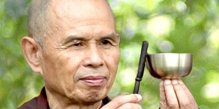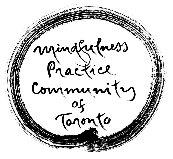
A global spiritual leader, revered throughout the world for his powerful teachings and bestselling writings on the art of ‘mindfulness’. Affectionately known as Thây (pronounced ‘tie’), which is Vietnamese for Teacher, his books, of which there are more than one hundred, have reached a global audience of millions.
Thich Nhat Hanh’s key teaching is that, through mindfulness, we can learn to live happily in the present moment instead of getting lost in the past and in the future. Dwelling in the present moment, according to Thich Nhat Hanh, is the only way to truly develop peace, both in oneself and in the world. Thich Nhat Hanh is the spiritual head not only of his lineage within Vietnam, but also of an international “engaged Buddhist” community of over 500 monks and nuns, and tens of thousands of lay practitioners, who apply his teachings on mindfulness, peace-making, community-building and serving society in practice centres all over the world.
Born in central Vietnam in 1926, he became a novice monk at the age of sixteen. During the Vietnam War monasteries were confronted with the question of whether to adhere to the contemplative life and remain meditating in the monasteries, or to help the villagers suffering under the bombings and other facets of the war. Thich Nhat Hanh was one of those who chose to do both, helping to found the “engaged Buddhism” movement.
His life has since been dedicated to the work of inner transformation for the benefit of individuals and society. In Saigon in the early 60s, Thich Nhat Hanh founded the School of Youth and Social Service, a grass-roots relief organization that rebuilt bombed villages, set up schools and medical centers, resettled homeless families, and organized agricultural cooperatives. Rallying some 10,000 student volunteers, the SYSS based its work on the Buddhist principles of non-violence and compassionate action. Despite government denunciation of his activity, Thich Nhat Hanh also founded a Buddhist University, a publishing house, and an influential peace activist magazine in Vietnam.
In 1966, after visiting the U.S. and Europe on a peace mission, he was banned from returning to Vietnam. On subsequent travels to the U.S., he made the case for peace to federal and Pentagon officials including Robert McNamara. He may have assisted in changing the course of U.S. history when he persuaded Martin Luther King, Jr. to oppose the Vietnam War publicly, helping to galvanize the peace movement. The following year, King nominated him for the Nobel Peace Prize. Subsequently, Nhat Hanh led the Buddhist delegation to the Paris Peace Talks.
In 1982 he founded Plum Village, a Buddhist community in exile in France, where he continues his work to alleviate suffering of refugees, political prisoners, and hungry families in Vietnam and throughout the Third World.
In addition to Plum Village he has founded numerous practice centers around the world in countries including the United States, Germany, Thailand and Hong Kong.
In 2007, Thich Nhat Hanh was invited to address the opening of the Parliament of India, and in 2011 was invited to the United States Congress for a second time to address Congressmen and -women on Capitol Hill.
He has also received recognition for his work with Vietnam veterans, meditation retreats, and his prolific writings on meditation, mindfulness, and peace. He has published some 85 titles of accessible poems, prose, and prayers, with more than 40 in English, including the best selling Call Me by My True Names, Peace Is Every Step, Being Peace, Touching Peace, Living Buddha Living Christ, Teachings on Love, The Path of Emancipation, and Anger.
